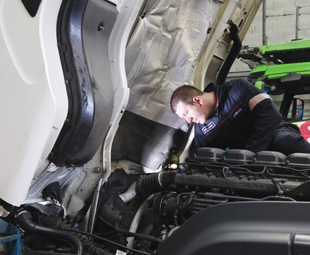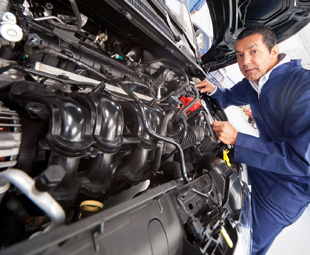No part-time job

GAVIN MYERS chats to Erwin Stroebel – regional manager: Eastern/Southern Cape and Border, Retail Motor Industry Organisation (RMI), and director: Motor Parts and Equipment Association (MPEA) – about the current state of the local parts industry.
It’s a tough job supplying parts to the South African market – there are more than 3 900 models of vehicles currently on local roads, with some of them having more than 25 derivatives! The demand is huge, and sales, says Stroebel, are buoyant.
However, as with every industry, challenges are posed by local and international conditions.
“Labour uncertainty and rising labour costs, along with the uncertainty of electricity supply that coincided with its rising cost and the weakening rand, have all posed serious challenges for the aftermarket parts industry,” Stroebel explains.
“Consumers are opting to repair and maintain older vehicles instead of replacing them, which positively assists the sale of aftermarket parts, but negatively impacts the consumer’s disposable income. This has, however, resulted in smaller component manufactures becoming marginally more profitable, with imported products now being more competitive,” he adds.
For a number of reasons, the price of parts is going up. says Stroebel: “As a lot of parts are imported, the price of metal and the exchange rate affect the local parts industry. The currency weakness also has an effect on the oil price, which impacts the fuel price. Consumers are trying to drive less, which means they service less often and this obviously also pushes up prices.”
Naturally then, one would expect consumers to go shopping for cheaper parts. Those emanating from the east immediately spring to mind, though Stroebel suggests that there are some local importers “bringing in A-grade parts” from China.
“There are also unscrupulous dealers bringing in cheap, bad-quality parts. By way of example, some lamp and light distributors import lower-priced Chinese products. This has a negative effect on locally manufactured parts, which also affects local job security,” he says.
 We then get to the issue of “pirate parts”, a term Stroebel warns consumers to not be confused by … It is important to remember that original equipment manufacturer (OEM) and original equipment supplier (OES) parts are made by the same manufacturers, but supplied under different brand names.
We then get to the issue of “pirate parts”, a term Stroebel warns consumers to not be confused by … It is important to remember that original equipment manufacturer (OEM) and original equipment supplier (OES) parts are made by the same manufacturers, but supplied under different brand names.
On the other hand, private-label parts and pirate parts are trickier. Private-label parts are generally sold with some form of guarantee and someone to back up that guarantee. “In many cases, these are sufficient for the cash-strapped consumer,” says Stroebel.
True pirate parts are deliberate counterfeits. These are often copied illegally and passed off as the real thing, and are of very bad quality. As the saying goes; if it’s too good to be true, it probably is … “These are the parts that consumers must stay away from,” warns Stroebel.
“The use of ‘pirate’ parts is always an emotive issue in the independent aftermarket parts industry,” he adds. “A pirate part is as we’ve described, but I do sometimes think the term is bandied about by some who want to scare the consumer into believing that the OEM’s parts are superior to an alternative aftermarket parts … As we’ve discussed, these are very often the same parts supplied to OEMs, as well as into the aftermarket industry, but generally at more affordable prices.
“It is common knowledge that no OEM can manufacture all the components required to assemble a vehicle, or to sell as OEM parts in the aftermarket. All MPEA member companies sell premium, branded alternative parts and, without exception, OEMs procure these products from the same original equipment suppliers as our members do,” he continues.
Owners of older vehicles – for which parts are no longer made by an OES – might find this notion worrying. However, Stroebel notes that the MPEA caters for these models through various private-label brands.
“Suppliers of these brands need to conform to rigid quality criteria … such as ISO.TS 16949, other ISO standards, SAE and comply with letters of authority where applicable. These quality requirements vary per product, but all safety-critical and high-risk products sourced by MPEA members are continuously sent to independent accredited facilities for testing,” he assures.
It doesn’t matter how small the product is. “Even a small item like a radiator cap, if faulty, can lead to engine failure!” Stroebel says.
The obvious way to ensure you are buying safe products is to deal with an accredited RMI and member. “Consumers need to buy from recognised retail outlets that they trust, and know that the supplier will honour its warranty. All parts that are sold are covered by the Consumer Protection Act (CPA), with an implied warranty of six months, although some offer warranties of 12 months and more.”
Stroebel suggests that buyers always compare the cheaper brand’s price to that of the premium brand. “If it is too cheap, when compared to other private-label brands in the market, ask why. Also look for OEM logos and approved brand logos.”
While the CPA is meant to help protect the consumer, those who do find themselves in a worrying situation can contact the Motor Industry Ombudsman of South Africa, who enforces the CPA.
It may be a tough job supplying parts, but, if done wisely, it needn’t be tough when buying them.
Published by
Focus on Transport
focusmagsa




